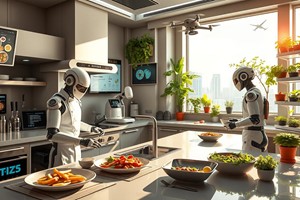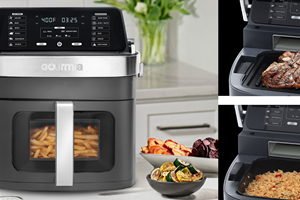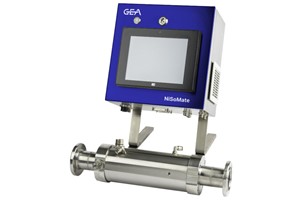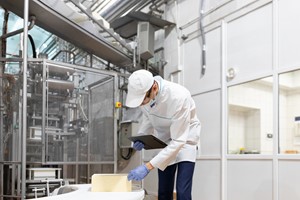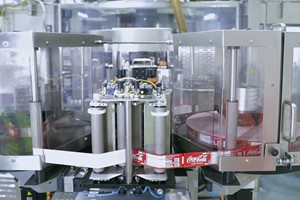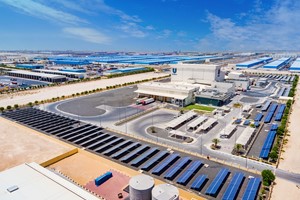Did you know the global food tech market is set to hit $250 billion by 2022? Technology is changing the food industry in big ways. It’s making things more efficient, sustainable, and better for consumers.
Smart farming, AI in production, and new supply chain methods are just the start. These technologies are changing the food world. They’re making food production more productive, reducing waste, and making consumers happier.
Let’s explore how technology is changing the food industry. We’ll see how it’s improving farming, processing, and how we eat. Get ready to be amazed by the latest tech changes in the food world.
Embracing the Food Tech Revolution
The food industry is seeing a big change with new tech. Things like artificial intelligence and robotics are changing how food is made, sold, and eaten. These changes make food production more efficient, sustainable, and better for consumers.
AI is making big impacts in the food world. It helps make better decisions and improves how food is made. Robots and automation are also becoming common. They help make food faster, cheaper, and more consistent.
This tech change isn’t just about making food. It’s also changing how food gets to us. Online shopping and new food delivery services use tech to give us what we want easily. They meet our changing tastes and needs.
The food tech world is still growing. We’ll see even more changes soon. Things like sustainable tech, new startups, and smart farming will shape the future. Together, they’ll make the food industry more efficient, responsive, and focused on what consumers want.
Smart Farming: Optimizing Crop Yields
Agriculture is changing fast, thanks to smart farming technology. Precision farming uses advanced sensors, data, and GPS to improve crop growth. Farmers can now use resources better, grow more, and waste less. They also adopt greener farming methods.
IoT devices and smart farming systems are key to this change. They make farming more efficient and green. With real-time data, farmers can make better choices, adapt to weather, and get more from their land. Smart farming is changing how we farm today.
The world’s population is growing, and we need new ways to feed everyone. Smart farming can help by making crops more efficient and reducing waste. It brings new tech to farming, making our food system better and more productive.
AI and Machine Learning in Food Production
The food industry is changing fast, thanks to AI and machine learning. These technologies are making food production better in many ways. They automate tasks, improve quality control, and make things more efficient.
AI and ML are great at predictive analytics. They look at lots of data to predict things like crop yields and what people will buy. This helps food makers work smarter, cut down on waste, and get more done.
AI and ML also help with quality checks. They can look at food products and spot problems that humans might miss. This makes food safer and helps keep quality high.
As AI and ML become more common in the food industry, we’ll see even more cool uses. They’ll help make food production better, greener, and more enjoyable for everyone. From predicting sales to checking food quality, these technologies are changing the food world for the better.
Robotics and Automation in Food Processing
The food industry is using automation and robotics to change how it works. Tasks like sorting, packaging, and palletizing are now done by machines. This makes the food processing process smoother and more efficient.
Collaborative robots, or cobots, work with people to make things better. They help improve how things are done and make it safer for everyone. This partnership between humans and machines is very effective.
Automation in the food industry is not just about replacing people. It’s about making processes better and letting workers do more important tasks. Robots can work fast and accurately, which means better quality and less waste.
By using advanced technologies like machine learning and artificial intelligence, the food industry is getting even better. It’s becoming more efficient, safer, and more innovative.
As more food processing uses automation and robotics, we’ll see even more improvements. These technologies are making food production better for companies and improving what consumers get. They help make food products higher quality and more consistent.
How Tech is Revolutionizing the Food Industry
The food industry is changing fast, thanks to new technology. This tech is making everything from farming to eating food better. It’s making food production more efficient, sustainable, and tailored to each person’s taste.
New tech like smart farming, AI, and robots is boosting crop yields and improving food quality. These tools are making farming more productive and reducing waste. They also help protect the environment.
Technology is also changing how we buy and enjoy food. Online shopping and better supply chain tools make it easy to find and buy food. Even virtual grocery shopping and personalized recipes are now possible.
As tech keeps improving, we’ll see even more changes in the food world. This tech is making food production, distribution, and consumption better. It’s creating a more efficient, green, and personalized food system.
Food Supply Chain Innovations
Technology is changing the food industry in big ways. It’s making the supply chain more efficient, open, and quick to respond to what people want. New tools like blockchain, IoT, and cloud-based platforms are changing how food gets from farms to our plates.
Blockchain helps track food better, from start to finish. This means we can make smarter choices, check quality easier, and fix problems faster. IoT, on the other hand, improves how we manage stock and shipping. It gives us real-time info on where things are, how they’re doing, and when they’ll expire.
Cloud-based platforms help everyone in the food chain work together better. They let us share important info, like when things are made and how much we have. This helps businesses make better choices based on solid data, making them more efficient and quick to react.
As tech keeps changing the food world, using these new tools is key to staying ahead. By adopting these innovations, companies can work better, cut down on waste, and meet the needs of tech-smart shoppers.
Food Delivery and E-Commerce Platforms
The rise of online food delivery and e-commerce has changed how we get and eat food. These tech solutions bring us more convenience, personal choices, and a broader food selection. Startups use data, AI, and mobile tech to make food delivery better and meet our changing tastes.
Food tech startups lead this change, creating platforms that link us with our favorite places to eat and shop. These platforms use smart algorithms for meal suggestions and improve delivery routes. This makes it simple to find and order food, whether it’s a fancy meal or everyday items.
But tech’s impact goes beyond just shopping and delivery. Startups are working on making the food supply chain better, from farming to packaging. Technology is making the food industry more efficient, green, and ready for today’s consumers.
Sustainable Food Tech Solutions
The world of food technology is changing fast, with a big focus on sustainability. New startups are leading the way with eco-friendly and responsible solutions. They’re working on everything from new protein sources to better ways to make food.
Alternative protein sources are a big deal in sustainable food tech. Startups are using new tech to make plant-based and cultured meats that taste and feel like the real thing. But these options are much better for the planet. They’re a great choice for people who want to eat more sustainably.
Precision fermentation is another big innovation. It lets companies make important food ingredients like proteins and fats without farming. This way, startups can make these key items with less harm to the environment. It’s a big step towards making food production more sustainable.
Startups are also working on solving the problem of food waste. They’re using upcycling tech to turn leftover food into new, useful products. This helps reduce waste and makes the food system more circular and sustainable.
As more people look for sustainable food options, startups are leading the way. Their innovative solutions are crucial for making the food industry more environmentally friendly in the future.
The Rise of Food Tech Startups
The food industry is seeing a big change with new food tech startups. These companies use technology to change old ways of doing things. They focus on smart farming, new proteins, cutting down food waste, and making food just right for you.
These startups are leading the way in how we grow, sell, and eat food. They use data, AI, and automation to make things better. This means less waste and food that’s just what you want.
New business models and ways to sell food have come from these startups. Online grocery stores and meal kits are examples. They meet what people want and help solve big food industry problems.
These startups are getting a lot of money and attention. They’re seen as key to the food industry’s future. By using tech, being green, and focusing on what people want, they’re changing how we see and use food.
Challenges and Ethical Considerations
The food industry is moving fast with new technology. But, it’s facing many challenges and ethical questions. New tech in food has changed things a lot, but it also brings its own problems.
Data privacy is a big worry. With smart farming and AI, lots of data is being collected. We need to make sure this data is used safely and ethically. Also, algorithms in the food chain must be fair and include everyone.
Automation in food processing is another issue. It might lead to jobs being lost. We need to make sure new tech creates jobs and helps workers.
Finally, the environmental impact of some food tech is a concern. While new tech can be green, we must look at its energy use and waste. This helps keep our planet safe.
The food industry must find a balance with new tech. We need to solve these problems to help everyone. This way, the tech revolution will benefit us all.
Conclusion
The food industry is changing fast, thanks to new technologies. Smart farming, AI in making food, and better supply chains are just the start. These changes are making food production, distribution, and consumption better.
These technologies can solve big problems like food security and environmental issues. They also help make food that fits each person’s needs. As these techs get better, we’ll see more open and connected food systems.
The future of food looks bright and full of change. With technology, the food industry can keep improving. It will offer solutions that are good for our planet and for us.
https://tech-tomorrow.com/





